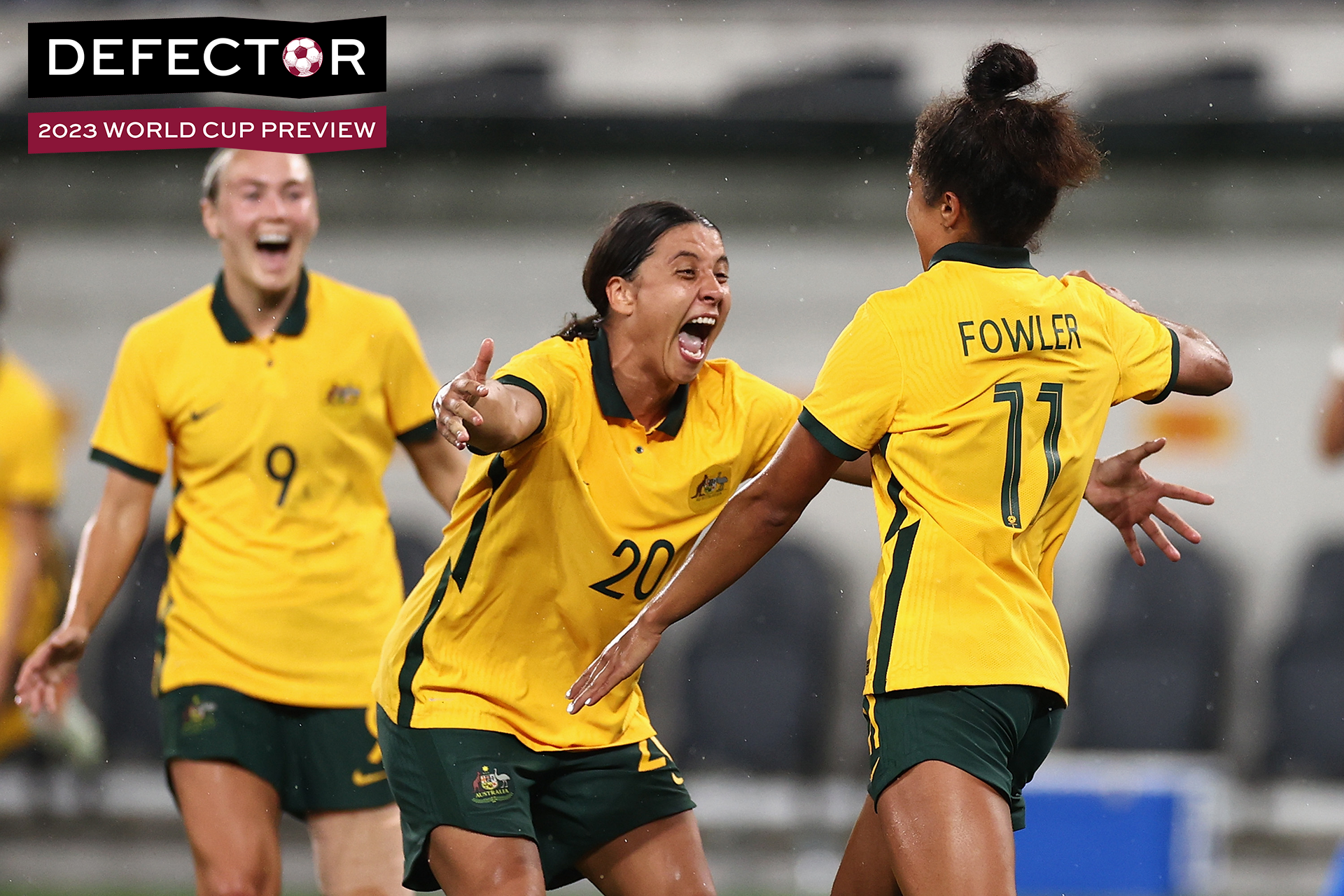It’s almost time for the 2023 World Cup. To help get you ready, we will be providing you with precious information about every team in the tournament. You can read all of our team previews here.
As Tom Ley said in his preview of New Zealand for the 2023 World Cup, being the host nation of a tournament is a heavy burden to carry. If that is true for the Football Ferns, who are trying to simply get a foothold in World Cup history, then it is doubly so for Australia, the better of the two hosts and one of the handful of teams with a real shot at winning the trophy this time around. The Matildas are at home—with how the bracket was split up, they will not play a single game in New Zealand, instead bouncing around Sydney, Melbourne, and Brisbane—and they are good, if not particularly great.
That makes their journey all the harder, though. Unlike New Zealand, who was handed a group that would be winnable if only that team was a bit better, Australia has a much more difficult draw. Despite being in Pot 1 for the draw as one of the hosts, the Matildas were handed the hardest challenge in Pot 2 in seventh-ranked Canada. As if that weren't enough, both Ireland and Nigeria were in the upper halves of their respective pots; Nigeria has the highest ranking in Pot 4, while Ireland is third in Pot 3, but 24th in the world is no pushover. This is gonna be a grueling group stage for Australia, albeit one that they should survive.
How they survive will be the most important part, though. If Australia finishes first, they will likely play China or Denmark in the round of 16. Not easy matchups but definitely easier than the reigning European champions of England, who would likely be the opponent if Australia were to finish second in Group B. Australia did beat England in a friendly back in April, and in London at that; would they be able to repeat in a showdown in Brisbane? Maybe, but if Australia is really looking to win this World Cup, or at least go further than ever before (the previous best for the country is a quarter-finals exit, accomplished in 2007, 2011, and 2015), then it will have to look at beating Canada for the top spot.
There will be joy in Australia hosting its first major tournament in soccer history, of course. This is a big deal for the country. The Matildas will have to rise up to meet that moment, though, or it's possible, and not even that unlikely, that both hosts would go out in the group stage. Thanks to the tough draw, nothing is guaranteed for Australia here, but they should have just enough firepower and experience to not trip up early. What happens after the group stage will define whether this tournament will be a missed opportunity or one that the country of Australia will never forget.
Who Is Their Star?
What can one even say about Sam Kerr and her absolutely bonkers career? Well, I guess I can list her accomplishments: Australia's 29-year-old striker-comma-captain-comma-legend is the Matildas' all-time leading scorer. She is also the NWSL's all-time leading scorer and a two-time MVP stateside, despite leaving the U.S. for Chelsea and the Women's Super League in 2020. Since making that move to England, Kerr has scored almost a goal per game for the Blues, as the team has won four straight WSL titles and three Women's FA Cups. She also won the WSL's Player of the Season for 2021-2022, a campaign in which she scored 20 goals in 20 league matches. To summarize: Sam Kerr is amazing, has been amazing everywhere she's been, and is not just Australia's best player, but one of the very best in the entire tournament.
What exactly is it that makes Kerr one of the best strikers women's soccer has ever seen? That's trickier to answer. She doesn't do anything statistically that jumps off the page, besides her goal totals. She's not in the top 10 percent of any offensive statistic for strikers in the top eight leagues in the world, except aerials won (3.05 per 90 minutes, good for the 94th percentile). She's not the best dribbler of the ball, nor does she shoot at a particularly high rate.
What she does well doesn't show up on the statistics, besides the goals. Kerr is one of the best movers in the world without the ball. When she is given the freedom to drift wide from the striker spot and then cut back in towards the box, there are few players more intelligent and precise in where they position themselves. She's also strong, often stronger than the center backs that have the unenviable task of defending her. This allows her to play both in motion and with her back to the goal, creating for teammates running into the box. This is helpful for a team like Australia, because it gives them a pillar to play off of in the center of the park. Kerr also works as a target for crosses; as previously mentioned, she's great in the air, and can also bring the ball down before volleying it into the goal.
In short, Kerr is just a perfectly well-balanced striker. It would be unfair to call her a jack of all trades and master of none, because she is truly elite at placing the ball into the back of the net, but the archetype starts and ends with her. That she is also passionate and emotive on the pitch will serve her well as the captain of the Matildas on home turf; the team will likely rally around her energy in front of the home fans. Given her pristine track record, she should give those same fans a lot to cheer about during the World Cup.
Tell Me About A Cool Youngster
20-year-old Mary Fowler might not have had the best debut year in England this past season, but she is still the Matildas' best prospect heading to the World Cup. Having moved from Montpellier in France to Manchester City before the 2022-2023 season, Fowler had already been on top teams' radars thanks more to her international performances for Australia. She debuted for the senior side at the age of 15 back in 2018, and was even called up for the World Cup the next year, though she did not get any game time. It was really the Tokyo Olympics in the summer of 2021 that put her in the spotlight, as she played in all six matches for Australia while in Japan, and she scored the first of two go-ahead goals in extra time against Great Britain in the quarterfinals.
Since then, she has become a staple for the Matildas, despite her young age, having picked up a total of 31 caps and scoring nine goals. She has formed a neat little partnership up with Kerr, starting most recently in Australia's 2-0 win over England in April. Fowler, like Kerr, can be fluid in her movement up front, allowing her to not just befuddle defenders, but also open up space for Kerr to run in behind. When Fowler receives the ball, she is not afraid to shoot and she is lethal when she does. This allows both of Australia's deadly forwards to bounce back and forth between who is the striker and who is the one setting up the attacks, which in turn makes them much harder to defend.
Fowler can also play in the midfield if needed, allowing Kerr to play solo up top. This forces Fowler to use more of her passing vision and close control with the ball at her feet, two of her better talents that go somewhat unused as a striker. I still think her best role is in that second striker role next to Kerr, but she provides Australia with some tactical flexibility, and no matter where she pops up on the field, she's bound to create some chaos and, more importantly, some goals.
Who Is Their Enemy?
The region of Scandinavia might be Australia's worst enemy at this point, given that Sweden and Norway have knocked the Matildas out of two World Cups and the 2020 Olympics. However, as neither of those teams were drawn in Australia's group, the real enemy for them this summer will be the weight of expectations. Australia has never entered a tournament as favored as it is this time around, thanks to its hosting role and Kerr's continued excellence even as she nears her 30th birthday. While the Matildas were a high-powered offensive machine with little defense heading into the 2019 tournament, they come into this one a bit more well-rounded, and with Fowler hitting her stride as Kerr's partner in crime.
That might just make any sort of disappointment sting more this time around, though. Host nations tend to do well in the World Cup, but not great, unless that host is the United States. Not only is the USWNT the only host to win the trophy, they are in fact the only host to even make the final four (they won at home in 1999, and finished third in 2003). That's the pressure of being a good host, and it can get to teams who don't come prepared. So, more than Canada in the group stage, or a potential matchup against England, or somehow a showdown against one of the two Scandinavian sides in the field, Australia will have to contend with the history of this tournament, one that has never been all too kind to the nations inviting the world in. Who knows, though? There's always a first time for everything, and Australia might just be good enough to make a run to the semifinals and out of the host curse.
National Folk Hero Who I Think Is Cool
It's likely that no one has ever lived the ACAB lifestyle more thoroughly than Ned Kelly, Australia's main folk hero. Kelly was an Irish-Australian bushranger—essentially, an outlaw—who clashed with police in the English colony of Victoria for years in the late 1800s, evading capture and generally causing mayhem in the colony. His final stand, alongside his gang, saw them fight off police while wearing a suit made of the boards uses in plows, a makeshift set of bulletproof armor.
While his gang all died and Kelly was captured on charges of murder, theft, armed robbery, and assault, there was a movement among the people of Victoria to grant him a reprieve. That movement failed, and Kelly was hanged to death on November 11, 1880, but he's still considered an outlaw hero in Australia to this day.
Scran Or Not Scran: National Dish Edition
There isn't quite a consensus for what the national dish of Australia should be, so I'm going to take this one into my own hands. When I think of Australian food, I think of meat pies; this is probably because I lived next to an Australian restaurant in college, and that was their specialty. So, we're riding with that:
My verdict is simple here: Meat pies are absolutely Scran.
What Would A Successful World Cup Look Like For This Team?
The optimistic, and perhaps naive, answer to this is that Australia has to win the entire World Cup to consider this a success. That's a bit of a leap for a country that has never made it past the quarterfinals, though, even if Australia has never hosted the World Cup before. Can homefield advantage and Sam Kerr take them to glory? Maybe, but that's unrealistic.
At the very least, a run to the semifinals should be the bare minimum here. Anything less than that would and should be seen as a failure for the better of the two hosts of this tournament. As mentioned above, if Australia can win its tough group, then that becomes a lot more doable. If not, well, a round of 16 exit to England would just bum everyone out. It's hard to root against the hosts, so for everyone's sake down under, let's hope that doesn't happen.






